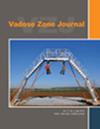Soil salinization in Portugal: An in‐depth exploration of impact, advancements, and future considerations
IF 2.8
3区 地球科学
Q3 ENVIRONMENTAL SCIENCES
引用次数: 0
Abstract
Soil salinization poses a significant threat to agricultural production in Portugal. Collaborative research spanning three decades with the U.S. Salinity Laboratory in Riverside, California, has been instrumental in advancing our understanding of this issue. This study provides a concise overview of the causes of soil salinization in Portugal, focusing on ongoing efforts to comprehensively address this challenge. Key advancements highlighted in this study encompass the meticulous characterization of soil hydraulic and solute transport parameters, the application of cutting‐edge modeling tools for water flow and solute transport in diverse agricultural systems, and the utilization of innovative proximal and remote sensing methods for mapping soil salinity. Noteworthy results and practical implications of these advancements underscore their relevance in real‐world scenarios. While celebrating these achievements, the study emphasizes the current nature of the ongoing research, highlighting the dynamic landscape of soil salinization. The study underscores the imperative need for further advancements to effectively cope with soil salinization, especially in anticipation of the intensification of agricultural practices and the looming impacts of climate change. This comprehensive overview not only encapsulates past achievements but also sets the stage for future research endeavors in mitigating the pervasive effects of soil salinization on agricultural sustainability in Portugal.葡萄牙的土壤盐碱化:对影响、进展和未来考虑的深入探讨
土壤盐碱化对葡萄牙的农业生产构成了重大威胁。我们与位于加利福尼亚州里弗赛德的美国盐碱化实验室进行了长达三十年的合作研究,这有助于加深我们对这一问题的理解。本研究简要概述了葡萄牙土壤盐碱化的原因,重点介绍了为全面应对这一挑战而正在进行的努力。本研究强调的主要进展包括对土壤水力和溶质迁移参数的细致描述、在不同农业系统中水流和溶质迁移尖端建模工具的应用,以及利用创新的近距离和遥感方法绘制土壤盐度图。这些进展所取得的显著成果和实际影响强调了它们在现实世界中的相关性。在庆祝这些成就的同时,该研究强调了当前正在进行的研究的性质,突出了土壤盐碱化的动态景观。研究强调了进一步推进有效应对土壤盐碱化的迫切需要,尤其是在农业实践不断强化和气候变化影响迫在眉睫的情况下。这一全面概述不仅概括了过去取得的成就,还为今后的研究工作奠定了基础,以减轻土壤盐碱化对葡萄牙农业可持续性的普遍影响。
本文章由计算机程序翻译,如有差异,请以英文原文为准。
求助全文
约1分钟内获得全文
求助全文
来源期刊

Vadose Zone Journal
环境科学-环境科学
CiteScore
5.60
自引率
7.10%
发文量
61
审稿时长
3.8 months
期刊介绍:
Vadose Zone Journal is a unique publication outlet for interdisciplinary research and assessment of the vadose zone, the portion of the Critical Zone that comprises the Earth’s critical living surface down to groundwater. It is a peer-reviewed, international journal publishing reviews, original research, and special sections across a wide range of disciplines. Vadose Zone Journal reports fundamental and applied research from disciplinary and multidisciplinary investigations, including assessment and policy analyses, of the mostly unsaturated zone between the soil surface and the groundwater table. The goal is to disseminate information to facilitate science-based decision-making and sustainable management of the vadose zone. Examples of topic areas suitable for VZJ are variably saturated fluid flow, heat and solute transport in granular and fractured media, flow processes in the capillary fringe at or near the water table, water table management, regional and global climate change impacts on the vadose zone, carbon sequestration, design and performance of waste disposal facilities, long-term stewardship of contaminated sites in the vadose zone, biogeochemical transformation processes, microbial processes in shallow and deep formations, bioremediation, and the fate and transport of radionuclides, inorganic and organic chemicals, colloids, viruses, and microorganisms. Articles in VZJ also address yet-to-be-resolved issues, such as how to quantify heterogeneity of subsurface processes and properties, and how to couple physical, chemical, and biological processes across a range of spatial scales from the molecular to the global.
 求助内容:
求助内容: 应助结果提醒方式:
应助结果提醒方式:


